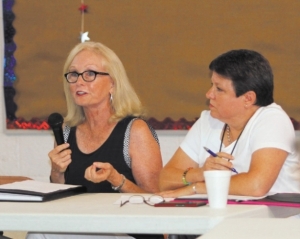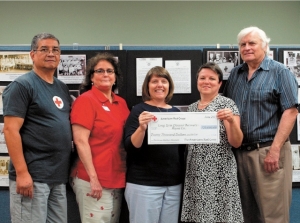Storm recovery group gets grant
By Steve Herring
Published in News on July 11, 2017 9:07 PM

News-Argus/STEVE HERRING
Long Term Disaster Recovery-Wayne County Chairman Barbara Stiles, left, and Vice Chairman Tara Humphries talk about the group's efforts during a Tuesday afternoon meeting at the Salvation Army building on North William Street.

Submitted photo
American Red Cross - Eastern North Carolina Region officials Roberto Mendoza, Disaster Leadership Team Member; Kathy C. Jones, Disaster Program Specialist; and Kimberly M. Berrier, Business Operations Specialist II and Community Partnerships present a grant for $20,000 to Long Term Disaster Recovery - Wayne County's Vice Chair Tara Humphries and Treasurer Ray Urban (left to right).
Wayne County's long-term recovery organization has been awarded a $20,000 American Red Cross Recovery Grant.
The grant will be used to provide direct assistance to those who have unmet needs as a result of Hurricane Matthew.
The grant specifies direct assistance, which means Long Term Disaster Recovery-Wayne County cannot use the funding for administrative expenses.
"The Red Cross received an overwhelming amount of generous support from our donors in response to the devastation caused by Hurricane Matthew," said Mark Smith, Red Cross Recovery operations executive director. "As a result, the Red Cross is working to supplement its ongoing disaster relief and recovery services by working with a number of organizations to assist families, individuals and communities in recovering from Hurricane Matthew."
Long Term Disaster Recovery-Wayne County is a coalition of public, private, faith-based and voluntary organizations. It was first formed in 1999 following Hurricane Floyd. It reactivated last November following Hurricane Matthew.
Its members include the American Red Cross; the Salvation Army; United Way; Habitat for Humanity; United Church of Christ; Episcopal churches; Four Day Movement; Literacy Connections; Wayne County Response Team; Federal Emergency Management Agency; Goldsboro Community Development; Wayne Community College; Seymour Johnson Air Force Base; N.C. Emergency Services; N.C. Voluntary Organizations Active in Disaster; Wayne Charitable Partnership; New Hope Presbyterian Church, USA; Catholic Charities; the Society of St. Vincent de Paul; and VFW Post 9959 among others.
The Salvation Army, is providing the coalition with the free use of office space and telephone at its offices at 610 N. William St.
"It is like people say anyone who has money, manpower or material," said Ray Urban, Long Term Disaster Recovery-Wayne County treasurer. "They contribute to us -- to getting the person's life back to normal, where it was before the storm."
The partnering organizations collaborate to assist Wayne County hurricane victims who have exhausted all other available resources to safe, secure and sanitary living conditions, said Tara Humphries, vice chairman of the group.
Its goal is to aid as many survivors who have unmet needs as possible by coordinating the responses of it partners and ensuring unduplicated, efficient use of resources, she said.
Long Term Disaster Recovery-Wayne County acts as a clearinghouse for those in need of assistance.
Casework is completed on storm victims to determine their hurricane-related needs and what resources or partners would be best matched with them, she said.
Those who qualify is assigned a caseworker who goes into the home to assess the situation.
The caseworker stays with them through the entire process. That could include working with that person across one or several partnering organizations, said Barbara Stiles, the group's chairman.
All of the case workers are volunteers.
Residents can start the process by calling 919-735-4811, ext. 113, or e-mail [email protected].
The organization is transparent and the public is invited to its meetings, Urban said.
To address concerns about duplication of services, the group uses an American Red Cross software tracking program.
Agencies helping people put the person's information into the system, Urban said.
Then any agency can look at the program and see what the person has received, he said.
Wayne County's group is among dozens of long-term recovery organizations working to assist with what the Federal Emergency Management Agency (FEMA) estimates are North Carolinians' $6.5 million in unmet needs resulting from the hurricane.
Donations are welcome, Ms. Humphries said.
"I mean they could do a nail drive for us," she said. "I mean when you are doing construction you are going to need those nails. They can do food collection because there are still folks who need the basics of food, toiletries and all that."
People also need towels, sheets and mattresses, Ms. Stile said.
While it appears that it has taken the organization a long time to get up and operating, it is actually a model for similar groups that don't even have their bylaws yet, Ms. Humphries said.
Also, the N.C. Voluntary Organizations Active in Disaster is holding a daylong workshop Thursday, July 20, at Wayne Community College, she said.
The process is more complicated than it was after Hurricane Floyd because of all the new privacy laws, Urban said.
FEMA and N.C. Emergency Management guide the coalitions. The North Carolina Voluntary Organizations Active in Disasters also provides oversight and helps secure volunteers, funding and supplies.
The American Red Cross shelters, feeds and provides emotional support to victims of disasters; supplies about 40 percent of the nation's blood; teaches skills that save lives; provides international humanitarian aid; and supports military members and their families.
The Red Cross is a not-for-profit organization that depends on volunteers and the generosity of the American public to perform its mission.
For more information, go to redcross.org or cruzrojaamericana.org
